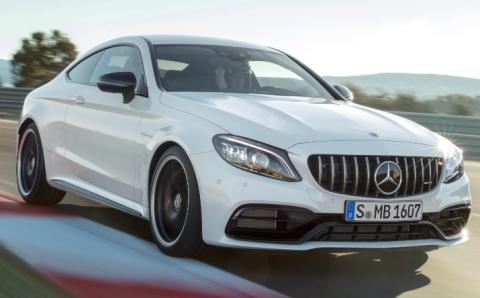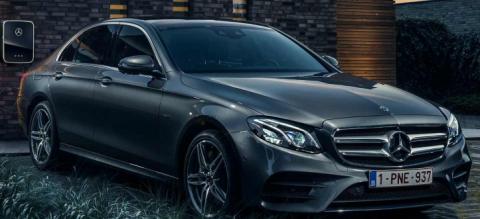The Saloon and Estate models of the new C-Class are starting to leave the production line at the Mercedes-Benz plant in Bremen. The bestselling Mercedes-Benz model series over the past decade will start production in Bremen, the lead plant in the global C-Class production network. This will shortly be followed by start-ups at international locations in Beijing, China and East London, South Africa.
Hybrid models will follow in quick succession – as part of the "Electric first" strategy equipped with battery systems supplied from the Mercedes-Benz battery plant in Jawor, Poland.
Local production in China for the Chinese market is a decisive success factor for Mercedes-Benz. China has been the largest sales market for the C-Class Saloon since 2016. The plant in Beijing produces the long-wheelbase version of the C-Class for the Chinese market.
In East London, right and left-hand drive Saloon models are built for worldwide export.
Production follows the latest production methods and processes including a new body shop system, improved flexibility, efficiency and sustainability. Thanks to innovative technologies, the paintshop at the plant in East London reduces energy consumption per vehicle by 25 percent.
Different production and powertrain variants can now already be flexibly realised and manufactured by Mercedes-Benz in the body shop.
The new body shop system is being deployed for the first time in C-Class production at the Mercedes-Benz plant in Bremen. Unlike in a traditional body shop, where the individual body parts are produced in line, the new body shop consists of various production cells, called "cubes", which can be flexibly combined with each other.
The cubes are fully networked with each other to use the advantages of big data.
The new body shop concept will be deployed successively in Mercedes-Benz plants worldwide.
Production of vehicles with different powertrains also plays a decisive role in the assembly shop of the Mercedes-Benz plant in Bremen. The C-Class is assembled on the same line as the GLC, the GLC Coupé and the all-electric EQC (combined power consumption: 21.5 kWh/100 km; combined CO2 emissions: 0 g/km).
Maximum flexibility is required here as well: a new TecLine in Bremen, modelled on Factory 56 at the Mercedes-Benz Sindelfingen site, represents the assembly system of the future. The TecLine bundles complex systems technology in one central location. This means that conversion work is even simpler and faster to carry out.
Driverless transport systems have replaced conventional conveyor belts.
At the Mercedes-Benz plant in Bremen, the principle of "digital shopfloor management" is used in all production areas – from the press plant to the body shop, surface finishing and final assembly. This allows all production data to be tracked in real time.
The quality of a vehicle can therefore be assured in real time with the MO360 application QUALITY LIVE. For this purpose QUALITY LIVE uses all data that are collected in the production process.
#CClass #HowIsMade
Hybrid models will follow in quick succession – as part of the "Electric first" strategy equipped with battery systems supplied from the Mercedes-Benz battery plant in Jawor, Poland.
Local production in China for the Chinese market is a decisive success factor for Mercedes-Benz. China has been the largest sales market for the C-Class Saloon since 2016. The plant in Beijing produces the long-wheelbase version of the C-Class for the Chinese market.
In East London, right and left-hand drive Saloon models are built for worldwide export.
Production follows the latest production methods and processes including a new body shop system, improved flexibility, efficiency and sustainability. Thanks to innovative technologies, the paintshop at the plant in East London reduces energy consumption per vehicle by 25 percent.
Different production and powertrain variants can now already be flexibly realised and manufactured by Mercedes-Benz in the body shop.
The new body shop system is being deployed for the first time in C-Class production at the Mercedes-Benz plant in Bremen. Unlike in a traditional body shop, where the individual body parts are produced in line, the new body shop consists of various production cells, called "cubes", which can be flexibly combined with each other.
The cubes are fully networked with each other to use the advantages of big data.
The new body shop concept will be deployed successively in Mercedes-Benz plants worldwide.
Production of vehicles with different powertrains also plays a decisive role in the assembly shop of the Mercedes-Benz plant in Bremen. The C-Class is assembled on the same line as the GLC, the GLC Coupé and the all-electric EQC (combined power consumption: 21.5 kWh/100 km; combined CO2 emissions: 0 g/km).
Maximum flexibility is required here as well: a new TecLine in Bremen, modelled on Factory 56 at the Mercedes-Benz Sindelfingen site, represents the assembly system of the future. The TecLine bundles complex systems technology in one central location. This means that conversion work is even simpler and faster to carry out.
Driverless transport systems have replaced conventional conveyor belts.
At the Mercedes-Benz plant in Bremen, the principle of "digital shopfloor management" is used in all production areas – from the press plant to the body shop, surface finishing and final assembly. This allows all production data to be tracked in real time.
The quality of a vehicle can therefore be assured in real time with the MO360 application QUALITY LIVE. For this purpose QUALITY LIVE uses all data that are collected in the production process.
#CClass #HowIsMade
- Category
- AMG








Comments